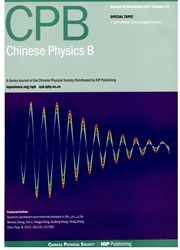

 中文摘要:
中文摘要:
A scheme for approximate generation of an N-qubit phase gate is proposed in cavity QED based on nonidentical coupling between the atoms and the cavity.The atoms interact with a highly detuned cavity-field mode,but quantum information does not transfer between the atoms and cavity field,and thus the cavity decay is negligible.The gate time does not rise with an increase in the number of qubits.With the choice of a smaller odd number l (related to atom–cavity coupling constants),the phase gate can be generated with a higher fidelity and a higher success probability in a shorter time (the gate time is much shorter than the atomic radiative lifetime and photon lifetime).When the number of qubits N exceeds certain small values,the fidelity and success probability rise slowly with an increase in the number of qubits N.When N →∞,the fidelity and success probability infinitely approach 1,but never exceed 1.
 英文摘要:
英文摘要:
A scheme for approximate generation of an N-qubit phase gate is proposed in cavity QED based on nonidentical coupling between the atoms and the cavity. The atoms interact with a highly detuned cavity-field mode, but quantum information does not transfer between the atoms and cavity field, and thus the cavity decay is negligible. The gate time does not rise with an increase in the number of qubits. With the choice of a smaller odd number l (related to atom-cavity coupling constants), the phase gate can be generated with a higher fidelity and a higher success probability in a shorter time (the gate time is much shorter than the atomic radiative lifetime and photon lifetime). When the number of qubits N exceeds certain small values, the fidelity and success probability rise slowly with an increase in the number of qubits N. When N→∞, the fidelity and success probability infinitely approach 1, but never exceed 1.
 同期刊论文项目
同期刊论文项目
 同项目期刊论文
同项目期刊论文
 Efficient scheme for implementing an N -qubit Toffoli gate by a single resonant interaction with cav
Efficient scheme for implementing an N -qubit Toffoli gate by a single resonant interaction with cav Quantum secure direct communication protocol with blind polarization bases and particles' transmitti
Quantum secure direct communication protocol with blind polarization bases and particles' transmitti Scheme for implementing 1 &rarr 2 symmetric economical phase-covariant telecloning of bipartite enta
Scheme for implementing 1 &rarr 2 symmetric economical phase-covariant telecloning of bipartite enta Entanglement sudden death of two atoms interacting with a cavity via the two-photon process in a str
Entanglement sudden death of two atoms interacting with a cavity via the two-photon process in a str Swap gate and controlled swap gate based on a single resonant interaction with cavity quantum electr
Swap gate and controlled swap gate based on a single resonant interaction with cavity quantum electr Simple schemes for generating the three-atom W state and the Greenberger-Horne-Zeilinger state among
Simple schemes for generating the three-atom W state and the Greenberger-Horne-Zeilinger state among Controlled generation of four-photon polarization-entangled decoherence-free states with conventiona
Controlled generation of four-photon polarization-entangled decoherence-free states with conventiona The influences of dipole-dipole interaction and detuning on the sudden death of entanglement between
The influences of dipole-dipole interaction and detuning on the sudden death of entanglement between Robust Conditional z Gate Operation in the Decoherence-Free Subspace of Superconducting Quantum-Inte
Robust Conditional z Gate Operation in the Decoherence-Free Subspace of Superconducting Quantum-Inte Influence of Kerr Medium on Entanglement of Cascade-Type Three-Level Atoms and a Bimodal Cavity Fiel
Influence of Kerr Medium on Entanglement of Cascade-Type Three-Level Atoms and a Bimodal Cavity Fiel Scheme for linear optical preparation of a type of four-photon entangled state with conventional pho
Scheme for linear optical preparation of a type of four-photon entangled state with conventional pho Two simple schemes for implementing Toffoli gate via atom-cavity field interaction in cavity quantum
Two simple schemes for implementing Toffoli gate via atom-cavity field interaction in cavity quantum Generation of unconventional geometric phase gates in ion trap-optical cavity system by squeezed ope
Generation of unconventional geometric phase gates in ion trap-optical cavity system by squeezed ope A quantum logic network for implementing optimal symmetric universal and phase-covariant telecloning
A quantum logic network for implementing optimal symmetric universal and phase-covariant telecloning One-step implementation of a swap gate with coherent-state qubits via atomic ensemble large detuning
One-step implementation of a swap gate with coherent-state qubits via atomic ensemble large detuning One-step generation of cluster states assisted by a strong driving classical field in cavity quantum
One-step generation of cluster states assisted by a strong driving classical field in cavity quantum Implementing a Fredkin gate via atomic-ensemble resonant interactions with two-mode cavity quantum e
Implementing a Fredkin gate via atomic-ensemble resonant interactions with two-mode cavity quantum e Efficient scheme for implementing a Fredkin gate via resonant interaction with two-mode cavity quant
Efficient scheme for implementing a Fredkin gate via resonant interaction with two-mode cavity quant 期刊信息
期刊信息
